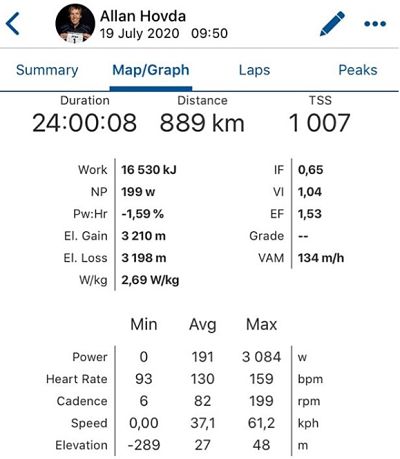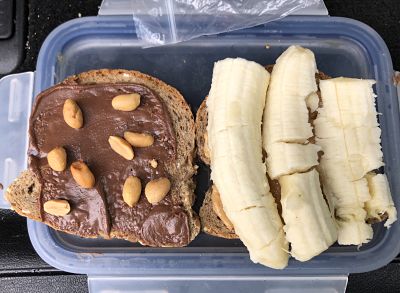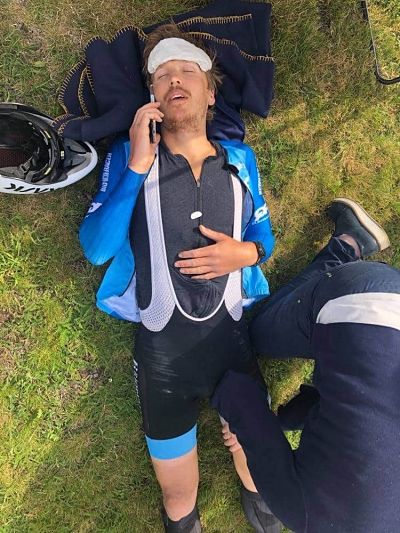We've seen a rise in the number of Fastest Known Time (FKT) and 'Furthest Distance' attempts during 2020 as athletes have attempted to make up for the lack of racing by finding creative ways of inventing their own competitions.
Allan Hovda - a three-time Norseman Extreme Triathlon winner - got in on the act in July as he took on the 24-hour cycling distance record attempt. His primary goal was to beat the Norwegian record of 767km but he hoped to ride at least 800km.
Prior to the attempt, Allan’s longest ride was a little over 300km in ~10 hours so he was moving into unchartered territory with his 24-hour challenge.
Allan planned a fairly flat loop for his ride - which featured just 50 metres of elevation - but that elevation mounted up to more than 3,000m with each passing loop of his 24-hour ride in Norway. To add to the challenge, the weather forecast predicted rain and wind - and unfortunately the forecast was very accurate.
Allan made the best of the less than ideal conditions (20 out of 24 hours poured with rain) and covered a whopping 885km (550 miles), in the process smashing the Norwegian record and finishing only just short of the official 24-hour world record of 915.39km (568.8 miles) set by Ralph Diseviscourt in July.
To put this distance into perspective, Allan averaged a speed of 37km per hour (23 mph) for 24 hours!

In light of his incredible achievement, we asked Allan for some insight into how he fuelled his 24-hour challenge…
So, Allan, how did you refine your nutrition strategy during training for a challenge like this during?
During a "short" event, like an IRONMAN, I pretty much only drink fluid for calories as my stomach doesn't handle solid foods when my heartbeat is in Zone 3. I knew that wouldn’t work for 24 hours as I get sick of sugar after ~7 hours.
For that reason, I went for the stuff I use in long training sessions as my intensity was similar to the long sessions, aka Zone 1.
On the day, my strategy went nearly 100% according to plan, at least I think so. The last 7-8 hours was kind of murky in terms of memory but I kept on eating the whole time and didn’t change anything special from my plan.
Looking at your intake in retrospect, would you have done anything differently? Did anything not work or could have been better?
My caffeine intake could have been better. I didn’t take caffeine until around 16 hours after I started riding at 10am and I didn't get enough from then on. My crew wasn't drilled on gels with or without caffeine and struggled understanding my instructions as I rode by.
Next time, I’ll probably be harder on the caffeine to get me through the hard patch between 2 and 4am.
On the flip side, what elements of your nutrition worked really well?
My "Poor Man’s Snickers" - it's basically quality brown bread with peanut butter, Nutella, a few salty peanuts and banana. It tasted like heaven, all day long.

Allan's nutritional intake for his 24-hour challenge:
| Type | Value |
|---|---|
| Total kcal: | 9934 |
| Kcal per hour: | 414 |
| Total Carbohydrate intake (g): | 1532 |
| Carbohydrate per hour (g): | ~64 |
| Total Fat intake (g): | 328 |
| Fat per hour (g): | ~14 |
| Total Protein intake (g): | 209 |
| Protein per hour (g): | ~9 |
This equated to a total intake breakdown of 61.9% carbs, 29.7% fat and 8.4% coming from protein.
What did this look like in real food?
- 5 x brown bread, peanut butter, Nutella, banana + salted peanuts
- 6 x Snickers bars
- 12 x Muesli bars (small)
- 5 x Muesli bars (large)
- 6 x Cookies
- 10 x PH 1000 All-Natural Drink Mixes
- 2.5 litres of Cola
What was your approach to hydration for such a long challenge?
That was super easy. I know my sweat salt content is 1228 mg/L following my Sweat Test. I also knew that allowing myself to be dictated by thirst would be sufficient to keep me hydrated because the intensity was relatively low and the temperatures likewise.
I used a PH 1000 drink mix for all my hydration, except for the coke towards the end. As my food contained some salt too, I knew that I would match my salt loss by +/- 10%, which I thought would be precise enough.
I imagine you felt pretty dreadful at times during the course of the 24 hours! Mentally, how did you overcome those tough times?
Funnily enough, by talking to myself.
I always talk to myself internally, but I actually spoke and screamed the words out loud.
"You are amazing", "You rock", “You are killing it" and similarly weird stuff. That has never happened before.
And last question Allan, did you manage to fit any power naps in at all?
My strategy from the start was to try not to fall asleep. No power naps or long stops.
Actually, I only stood still for about 6 minutes for the whole ride according to Strava, which I have difficulty believing.
Staying up for 24 hours is something I have way too much experience with because I do it regularly with my shift work on an oil rig. Neither my mind or body likes it, and I become cognitively-poor performing, but I probably handle it better than most.
Overall, staying up for 26 hours (I started 2 hours after getting up) was manageable. But, during my interview on a news channel right after the race I had to lay down because I was afraid I was going to fall asleep standing up - that was an epic video shot.
